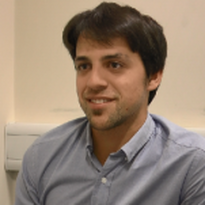Carlos

Carlos is a clinical trials coordinator and research physiotherapist. He has been in post for one and a half years. Carlos recruits some patients as well but most of his work is around clinical trial management.
Carlos is a clinical trials coordinator and research physiotherapist. His ethnic background is White Portuguese.
More about me...
Carlos is employed as a clinical trials coordinator and research physiotherapist. It is his first research job and he has been in post for one and a half years. Previously, Carlos completed a Master’s degree in his home country of Portugal whilst working clinically. He undertook a dissertation which was “challenging but really rewarding” and started him thinking about a research career. The research post was to set-up and manage a multicentre randomised controlled trial as part of a team. Once approvals for the study had been secured, Carlos recruited the first few patients at his own Trust. He still supports local patient recruitment but “with the demands of this trial, I was being a bit more pushed towards the coordinating side of things”.
The first few weeks and months in the research post were challenging for Carlos. There were unfamiliar acronyms and the use of these could make it difficult to follow meetings. Some of the acronyms were new to Carlos because they were specific to the UK research context. There was a lot to understand about the governance aspects of running a trial too. Carlos recalls that it took a few months before he felt comfortable with the language of research and what was involved in the job. He describes having had very good support from other members of the research team – including a senior clinical trial manager, the chief investigator, and a clinical trials unit. Carlos also went on training and had access to courses, “but I think the main help is being able to ask your colleagues and ask more senior trial managers what to do, because they’ve gone through it”. He likes working in a shared office as he can ask his colleagues for advice any time.
With regards to his recruitment activities at the start of the post, Carlos felt it was important to know the study remit very well. As a physiotherapist, he already had a good understanding of the topic of the study. Carlos found that patients sometimes had treatment preferences but highlighted that the person recruiting must also “be in a position of equipoise”. Carlos himself felt comfortable with the trial aims and the treatment arms involved. In his coordinating role, Carlos supports the various sites carrying out the study. This includes: preparing documents, checking feasibility and suitability of potential sites, conducting site visits, training research teams, and offering all-round support. Now the study is running, the team looks at the screening data to see if there are any barriers to participant recruitment – whether these be generic or local issues. They then liaise with those involved to help find solutions. For example, Carlos has arranged teleconference meetings where the top recruiting sites “share what worked for them, what didn’t, some tips and tricks they’ve got up their sleeves” to help those struggling with recruitment and retention.
Carlos had expected his job to be fixed-term and feels this is not a concern whilst he is young and without a mortgage or children. He is employed by a university and has an honorary contract with the Trust – the former has more benefits overall, but he likes that the latter means he can keep an NHS pension. About six months into his research post, Carlos also started working clinically part-time through twice-weekly evening clinics. He enjoys this extra work and thinks that being aware of patient concerns and priorities enriches his research insights. Likewise, he feels that having research experiences encourages him to “implement the best practice” in his clinical practice.
Carlos describes a broad range of research roles for physiotherapists. This spans from ‘research physiotherapist’ roles which tend to involve working on a number of studies mostly around recruitment and data collection, through to those where physiotherapists are designing and running their own studies. Carlos thinks that awareness of research jobs for physiotherapists and other allied health professionals has grown in recent years. He thinks this is because there are more opportunities, stronger emphasis on evidence-based practice, and earlier signposting of students to research. Speaking predominantly about his coordinating role, Carlos thinks the key skills are communication, teamwork, “project management, time management and prioritisation”. He feels it is crucial to establish good relationships with sites from the start so that they feel comfortable asking for support.
Carlos would like to continue his career in research combined with clinical practice. He’s not sure about his long-term plans, but intends to see the trial through to completion and contribute to publications. Carlos feels there are lot of directions and “doors that you can open” with a research career. A key message is that physiotherapists interested in research should try it out. He emphasises that there is scope to combine research and clinical work: “people that like research – they don’t have to give up on their clinical skills or clinical jobs. I think it’s something that complements each other”.


